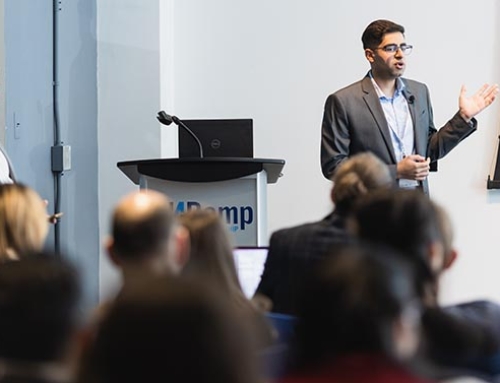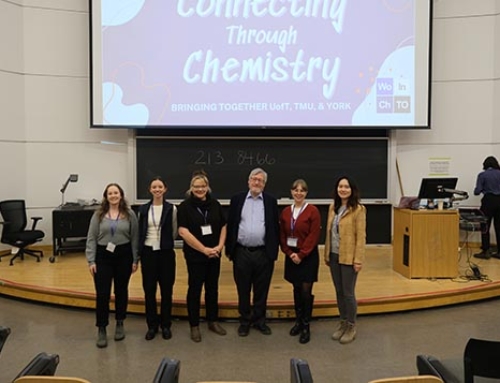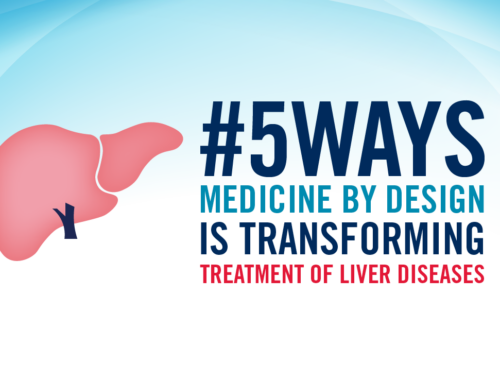
Juan-Carlos Zúñiga-Pflücker (left), senior scientist at Sunnybrook Research Institute, and Andras Nagy (right), senior investigator at Sinai Health System’s Lunenfeld-Tanenbaum Research Institute, ran a mini-symposium on next generation diabetes therapies.
The Medicine by Design-funded team projects led by Juan Carlos Zúñiga-Pflücker and Andras Nagy use distinct approaches. But they’re working to accomplish a shared goal: dialing back the immune response to make transformative regenerative medicine therapies a reality.
At a mini-symposium titled “Next Generation Approaches for Targeting Diabetes: Toward Immune Evasive Cell Therapy,” on Jan. 20, more than 10 presenters, both from Medicine by Design-funded labs and from the international community, focused on overcoming the barrier of the immune system. This work was discussed in the context of diabetes but is widely applicable to other cell therapies.
“Whatever you repair, you will have to confront the ongoing autoimmune response,” said Zúñiga-Pflücker, senior scientist at Sunnybrook Health Sciences Centre and chair of the Department of Immunology at the University of Toronto (U of T), in opening remarks. “Regenerative medicine approaches will require the establishment of tissue-specific immune tolerance.”
It’s an all-hands-on-deck type of problem, said Zúñiga-Pflücker, which is why he and Nagy each lead a team working on different strategies to solve the challenge.
This event was part of a series of symposia and workshops held by Medicine by Design-funded investigators on team projects, which are cross-disciplinary, cross-institutional and multi-year projects that Medicine by Design, which is funded by the Canada First Research Excellence Fund, has invested almost $50 million in. The events celebrate the progress of these ambitious projects, which aim to rapidly advance regenerative medicine, and are an opportunity for researchers to share the knowledge they have gained with the wider community.
Regenerative medicine therapies utilize stem cells to create cell therapies that can replace damaged or diseased cells. For instance, in type 1 diabetes — where the Zúñiga-Pflücker and Nagy teams are focusing efforts — the immune system attacks and damages pancreatic cells that secrete insulin. Many researchers are developing cell therapies that can place insulin-secreting cells back into the body, fixing the problem at its source.
But the immune system is a major hurdle to using cell therapies, since it will often attack the transplanted cells, mistaking them as intruders.
Nagy, who is senior investigator at Sinai Health System and a professor in the Department of Obstetrics & Gynaecology and the Institute of Medical Sciences at U of T, and his team are aiming to use “cloaking,” which involves employing strategies to make the new cells invisible to the immune system. Zúñiga-Pflücker and his team, in an immunoengineering strategy, are tweaking populations of immune cells to control the immune response.
The mini-symposium also featured many graduate students, research associates and post-doctoral fellows from labs across U of T and its affiliated hospitals. Invited speakers included Matthias Hebrok, from the Technical University of Munich and director of the Institute for Diabetes and Organoid Technology at the Helmholtz Center, Germany, and Cherie Stabler, a professor of biomedical engineering from the University of Florida.
Researchers came from a cross section of disciplines including immunology, physiology, biomedical engineering and cell biology. This convergence of disciplines is a hallmark of Medicine by Design, a strategic hub at U of T and its affiliated hospitals where scientists, engineers and clinicians collaborate to conceive and translate regenerative medicine approaches to transforming human health.
Elmar Jaeckal, medical director at the Liver Transplant Program, Ajmera Transplant Centre at the University Health Network (UHN), brought a physician’s perspective in his discussions of his therapies, currently being tested in clinical trials. Jaeckal aims to use a type of immune cell that can suppress immune response, called a regulatory T cell, to develop therapies that aim to induce tolerance.
All the Medicine by Design-funded labs that are working with Zúñiga-Pflücker’s and Nagy’s teams featured a speaker at the symposium, coming from institutions across Toronto including U of T, UHN, Sinai Health and Sunnybrook Health Sciences Centre.





